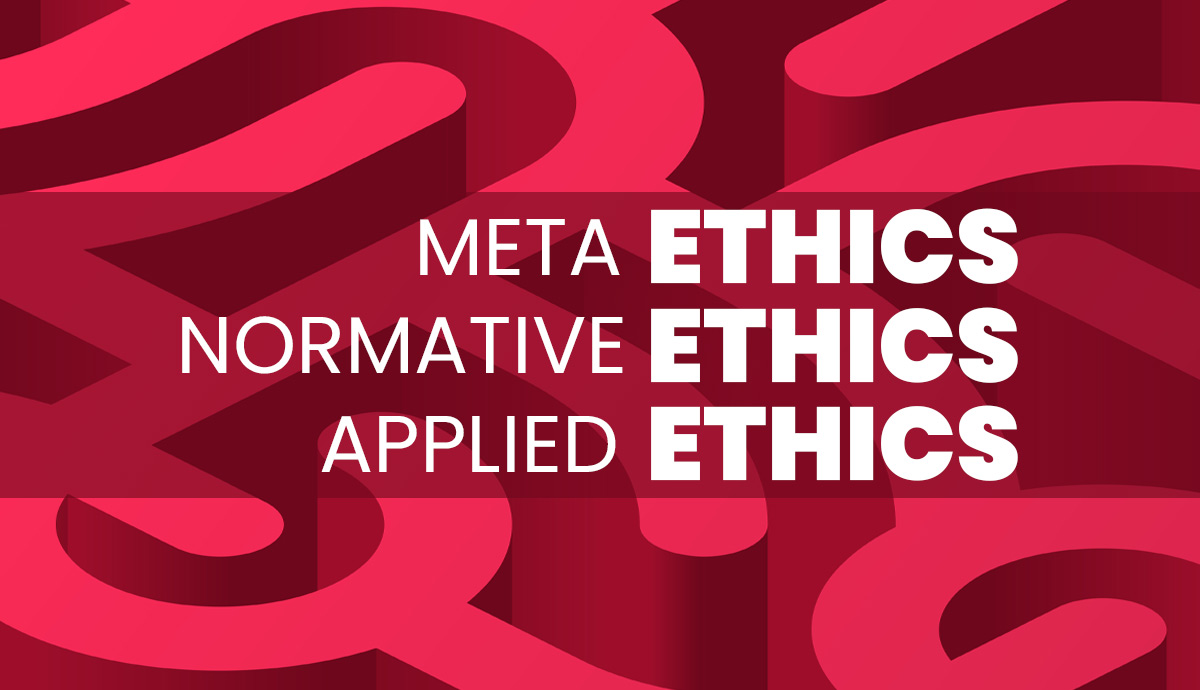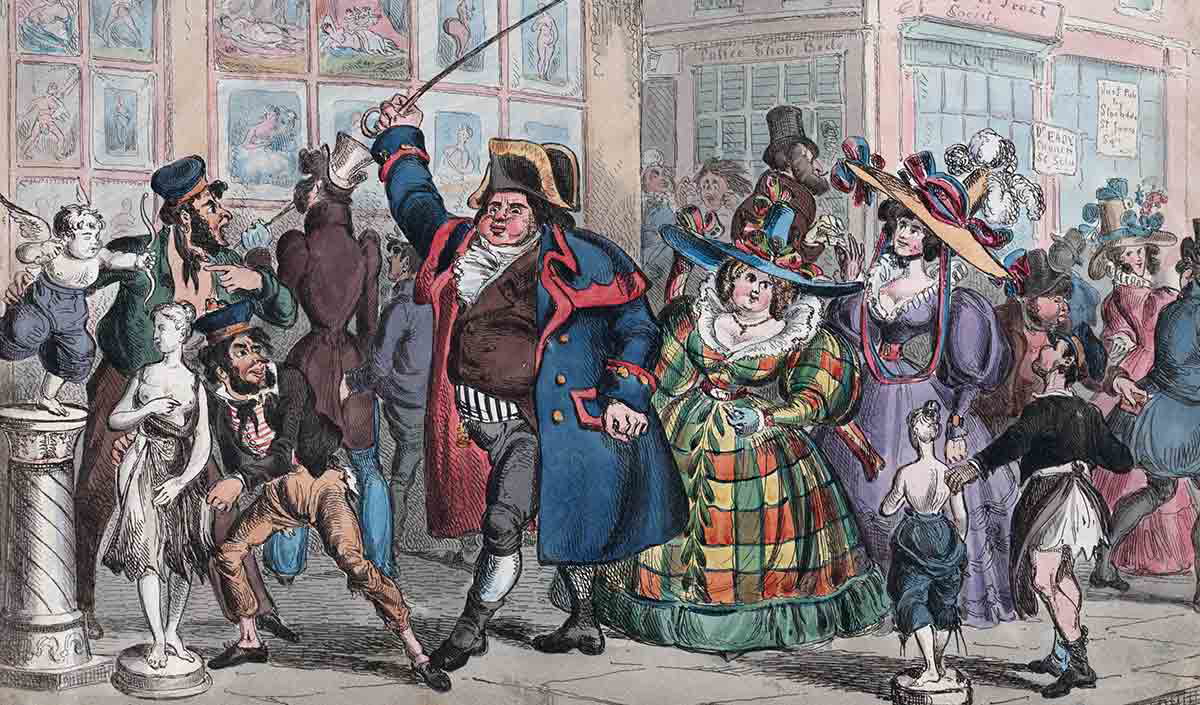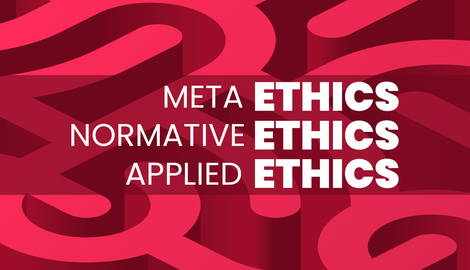
When thinking of the subject of Philosophy, Ethics is often recognized as one of its most well-researched and universally appreciated subfields. Most of us happen to ponder questions on morality at least once throughout our lives. Several of the decisions we make daily say something about our ethical judgments, and often, when something important is at stake, they cause us to ponder whether our actions are moral, what determines whether something is moral or immoral, and what morality is.
The Hierarchy of Ethics

The field of ethics is incredibly wide. It studies the concept of morality from several perspectives, resulting in distinct questions and the consequent development of numerous subfields.
What most of us ponder daily is whether an action is moral or immoral. Let’s take, as an example, a little white lie. White lies are those inconsequential and non-trivial lies that one can tell to avoid hurting another’s feelings. For example, is it immoral to tell your friends that you don’t like their new haircut? What about you not liking your new partner? And did you just buy the birthday present they gave you? Most likely, the answer is that it depends on the context and the situation. Hence, a definite answer to these questions cannot be given. The subfield of ethics called Applied Ethics ponders about this kind of practical matter. Its goal is to determine whether certain actions are moral or immoral.
However, to do so in a competent and informed manner, ethics must extend beyond practical matters and occupy itself with determining what makes actions moral. Normative Ethics is the branch of ethics that develops theories and frameworks dedicated to determining the rules of morality, i.e. what makes an action moral or immoral. Hence, to the question, “Is it immoral to tell your friend that you do not like their new haircut?” Normative Ethics does not attempt to answer “Yes” or “No,” but rather “Yes, because…” or “No, because…”
Finally, Normative Ethics must be grounded in another branch of ethics, known as Metaethics. To answer the question, “Why is this action moral or immoral?” one must understand morality and its features. Only by knowing this can one successfully develop a system to discern between moral and immoral actions.
1. Metaethics

Metaethics attempts to define morality’s ontology, i.e., its essence and true nature. Hence, rather than trying to determine whether actions like murder, stealing, or lying is moral or immoral, Metaethics is concerned with developing ways to define morality.
Take the sentence:
(1) Lying is wrong.
Metaethics is not concerned with whether lying is moral or immoral—that would be a concern of Applied Ethics. It also does not question the conditions under which lying would be permissible or the circumstances that may be underlying the rightness or wrongness of the action, as this would be a concern of normative ethics.
Instead, Metaethics steps aside from the more practical matters of the quest and observes the issue of morality through a wider scope. Hence, its goal is to determine whether there is a way to assign a truth value to (1), i.e. assert that the statement is true (and therefore lying is wrong) or that it is false – and lying is right. The nature of the judgment on the action of lying is not a concern of Metaethics, which instead questions the actual possibility of making a judgment on the action of lying.
Within the branch of Metaethics, multiple theories have developed, all proposing distinct answers to the question of whether a judgment on a moral statement can ever be expressed. They can be classified into two groups, both with further ramifications. The first—known as cognitivism—consists of theories that argue that it is indeed possible to express a judgment on moral statements and determine whether they are correct or incorrect by assigning to them a truth value. On the other hand, the second—known as non-cognitivism—encompasses those metaethical theories that argue that it is impossible to express a judgment on the truth value of a moral statement like (1).
2. Normative Ethics

Having defined morality and the extent to which it can be determined, Normative Ethics consists of developing the framework of rules that determine whether an action is moral or immoral. Hence, while Metaethics asks, “What is morality?”, Normative Ethics asks, “What makes an action moral?”
Going back to the example in the paragraph above, the statement:
(1) Lying is wrong.
Could be deemed either true or untrue, determining the action of lying to be either moral or immoral. Normative Ethics questions the reasons why and the conditions under which one would determine the morality of lying. Hence, we are not yet concerned with the actual morality of the action but rather with the development of a framework of rules which will help to deem the action either moral or immoral.
With this goal in mind, Normative Ethics has developed several frameworks under which morality is obtained in different ways. Among the most relevant are Utilitarianism, Deontology, and Virtue Ethics.
Utilitarianism, Deontology, and Virtue Ethics

The maxim that could be associated with utilitarianism is that the ends justify the means. Moral actions under the utilitarian perspective must lead to the best possible good. Hence, the action of lying would be moral in circumstances in which it leads to the best possible outcome. For example, lying about the fact that you do not like your friend’s new haircut might boost their confidence with no particularly trivial consequences, therefore it can be deemed moral. Lying to your friend about the fact that their partner is harming them would be immoral, as it would lead to further harm being done to your friend.
Deontology, the moral theory famously perpetrated by Kant, claims that certain principles, rules, and laws determine morality and must be always followed. Therefore, deontologists would argue that lying is wrong in all situations, with no exceptions.
Finally, Virtue Ethics is a moral theory that relies on the Aristotelian concept of virtue. On this account, morality would be determined by one’s understanding and compliance with virtues. Virtue Ethics presupposes that each of us has an individual, cultural, and societal understanding of virtue and attempts to behave accordingly. Hence, the morality of an action would not be an objectively and universally agreed-upon matter but rather subjective to one’s own understanding of what it is to behave virtuously.
3. Applied Ethics

In the previous sections, we have explored the nature of morality through Metaethics and some of the moral theories that one can rely upon to determine whether an action is moral or immoral through Normative Ethics. While this investigation has helped us understand how to make an informed decision about whether an action is moral or immoral, we have not yet got to the heart of the problem.
The role of Applied Ethics lies in practically deciding whether an action is moral or immoral. It is what most people think of when moral philosophy is mentioned, and it is the most practical and applicable aspect of the field. However, it must be kept in mind that every matter and practical solution to moral problems suggested by Applied Ethics, to be successful must be grounded on Normative and Metaethics.
Back to sentence (1) about the moral value of the action of lying, in this section, we are finally concerned with determining whether lying is moral or immoral. However, any decision on this matter, for it to hold some accountability, must still be informed on what was discussed in the previous steps by relying on a particular framework and on a given definition of the nature of morality and the bounds under which it can be defined.
The field of Applied Ethics is often concerned with topical matters such as abortion, euthanasia, veganism, or punishment. Its job is to question the morality of each fact, event, action, or lifestyle to allow one to make more philosophically-informed decisions on sensitive matters.
The Role of Ethics

Throughout this article, we have expounded on the relevance of Ethics at all levels. While most questions about ethics arise from the need to determine the morality of a specific action, we have demonstrated how to make an informed decision on matters of morality. It is necessary to begin questioning what morality is and to what extent it is objectively determinable. Then, one must decide which conditions are necessary for an action to be moral according to a set of established values that one relies upon. Finally, and only at this point, one may be well-equipped enough to express a judgment on the morality of an action.
While the process may appear overly complex, one must keep in mind that when it comes to moral philosophy, a lot is at stake. Determining the morality of actions and understanding how to act morally goes beyond the act of philosophizing and has practical consequences for the way we live. Hence, the role of ethics in our everyday lives is crucial at all levels of existence, from the individual to the social, national, and global.










